Premolar
The premolar teeth, or bicuspids, are transitional teeth located between the canine and molar teeth. In humans, there are two premolars per quadrant in the permanent set of teeth, making eight premolars total in the mouth.[1][2][3] They have at least two cusps. Premolars can be considered transitional teeth during chewing, or mastication. They have properties of both the canines, that lay anterior and molars that lay posterior, and so food can be transferred from the canines to the premolars and finally to the molars for grinding, instead of directly from the canines to the molars.[4]
| Premolar | |
|---|---|
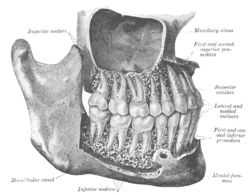 The permanent teeth, viewed from the right | |
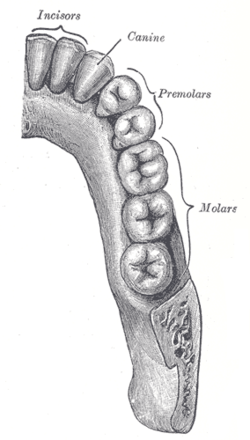 Permanent teeth of right half of lower dental arch, seen from above | |
| Details | |
| Identifiers | |
| Latin | dentes premolares |
| MeSH | D001641 |
| TA | A05.1.03.006 |
| FMA | 55637 |
| Anatomical terminology | |
Human anatomy
The premolars in humans are the maxillary first premolar, maxillary second premolar, mandibular first premolar, and the mandibular second premolar.[1][3] Premolar teeth by definition are permanent teeth distal to the canines, preceded by deciduous molars.[5]
Morphology
There is always one large buccal cusp, especially so in the mandibular first premolar. The lower second premolar almost always presents with two lingual cusps.[6]
The lower premolars and the upper second premolar usually have one root. The upper first usually has two roots, but can have just one root, notably in Sinodonts, and can sometimes have three roots.[7][8]
Orthodontics
The four first premolars are the most commonly removed teeth, in 48.8% of cases, when teeth are removed for orthodontic treatment (which is in 45.8% of orthodontic patients). The removal of only the maxillary first premolars is the second likeliest option, in 14.5% of cases.[9]
Other mammals
In primitive placental mammals there are four premolars per quadrant, but the most mesial two (closer to the front of the mouth) have been lost in catarrhines (Old World monkeys and apes, including humans). Paleontologists therefore refer to human premolars as Pm3 and Pm4.[10][11]
Additional images
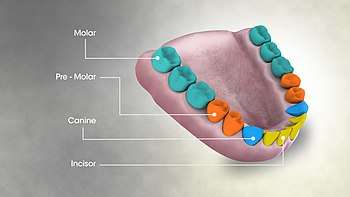 Medical animation showing Premolar teeth and its arrangement in the mouth of an adult human being
Medical animation showing Premolar teeth and its arrangement in the mouth of an adult human being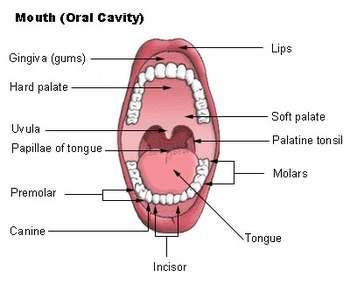 Mouth (oral cavity)
Mouth (oral cavity)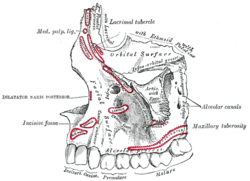 Left maxilla, outer surface
Left maxilla, outer surface Base of skull, interior surface
Base of skull, interior surface
See also
References
- Roger Warwick; Peter L. Williams, eds. (1973), Gray's Anatomy (35th ed.), London: Longman, pp. 1218–1220
- Weiss, M.L.; Mann, A.E (1985), Human Biology and Behaviour: An anthropological perspective (4th ed.), Boston: Little Brown, pp. 132–135, 198–199, ISBN 978-0-673-39013-4
- Glanze, W.D.; Anderson, K.N.; Anderson, L.E, eds. (1990), Mosby's Medical, Nursing & Allied Health Dictionary (3rd ed.), St. Louis, Missouri: The C.V. Mosby Co., p. 957, ISBN 978-0-8016-3227-3
- Weiss, M.L., & Mann, A.E. (1985), pp.132-134
- Warwick, R., & Williams, P.L. (1973), pp.1218-1219.
- Warwick, R., & Williams, P.L. (1973), p.1219.
- Standring, Susan (2015). Gray's Anatomy E-Book: The Anatomical Basis of Clinical Practice. Elsevier Health Sciences. p. 518. ISBN 9780702068515.
- Kimura, Ryosuke; Yamaguchi, Tetsutaro; Takeda, Mayako; Kondo, Osamu; Toma, Takashi; Haneji, Kuniaki; Hanihara, Tsunehiko; Matsukusa, Hirotaka; Kawamura, Shoji; Maki, Koutaro; Osawa, Motoki; Ishida, Hajime; Oota, Hiroki (2009). "A Common Variation in EDAR is a Genetic Determinant of Shovel-Shaped Incisors". The American Journal of Human Genetics. 85 (4): 528–535. doi:10.1016/j.ajhg.2009.09.006. PMC 2756549. PMID 19804850.
- Capelli Júnior, Jonas; Fernandes, Luciana Q. P.; Dardengo, Camila de S.; Capelli Júnior, Jonas; Fernandes, Luciana Q. P.; Dardengo, Camila de S. (2016). "Frequency of orthodontic extraction". Dental Press Journal of Orthodontics. 21 (1): 54–59. doi:10.1590/2177-6709.21.1.054-059.oar. ISSN 2176-9451. PMC 4816586. PMID 27007762.
- Christopher Dean (1994). "Jaws and teeth". In Steve Jones; Robert Martin; David Pilbeam (eds.). The Cambridge Encyclopedia of Human Evolution. Cambridge: Cambridge University Press. pp. 56–59. ISBN 978-0-521-32370-3. Also ISBN 0-521-46786-1 (paperback)
- Gentry Steele and Claud Bramblett (1988). The Anatomy and Biology of the Human Skeleton. Texas A&M University Press. p. 82. ISBN 9780890963265.